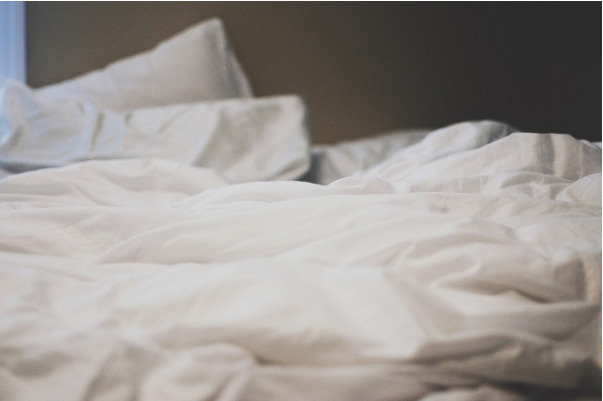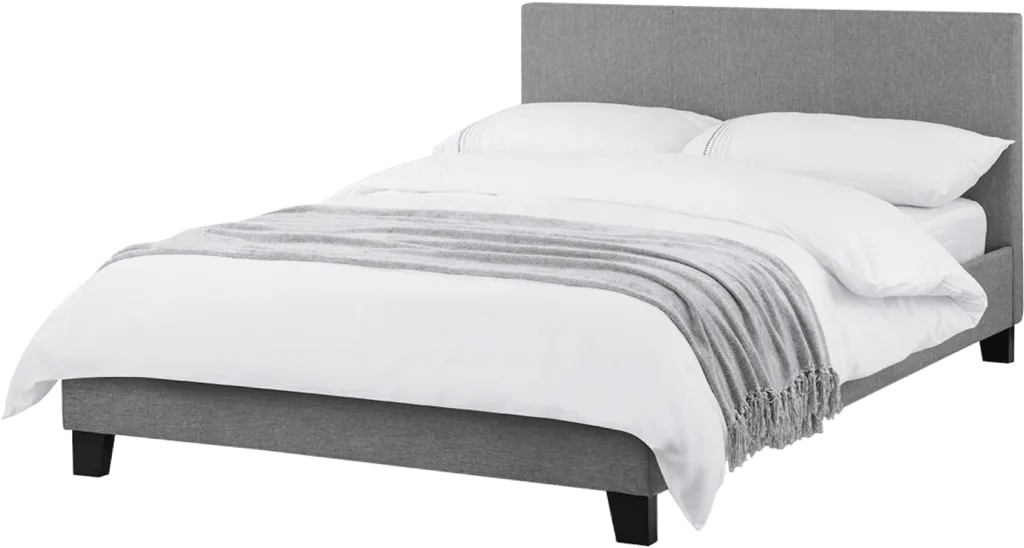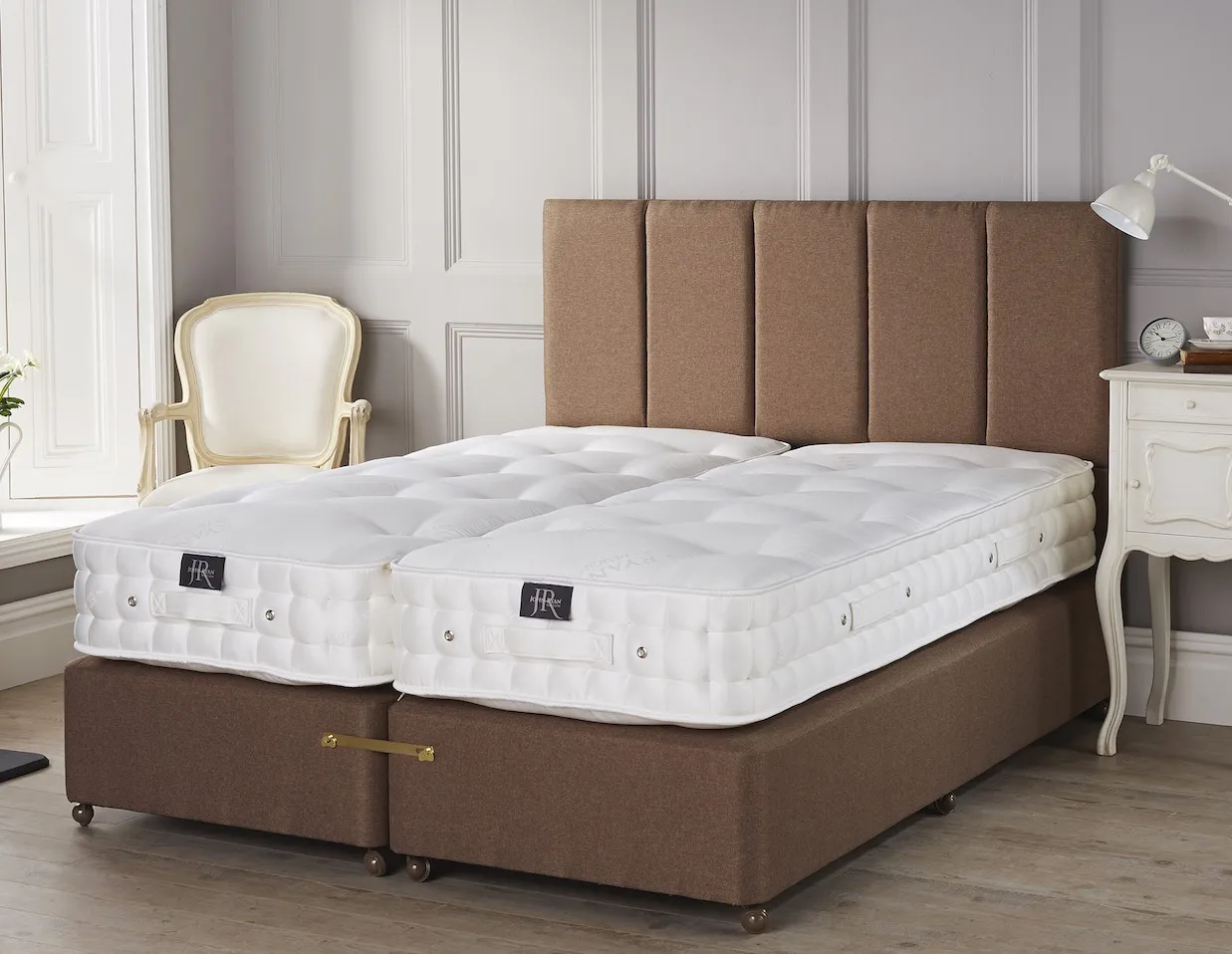Mental Health and Sleep: Strategies for a Balanced Mind
One of the best ways to foster a balanced and resilient mind is to ensure you get regular and undisturbed quality sleep. This sleep blog will delve into the intricate connection between mental health and sleep. We explore effective strategies to find an equilibrium between the two, leading to a calmer mind and a deeper, more restorative sleep pattern.

Understanding the Link Between Mental Health & Sleep
The interplay between mental health and sleep is profound. Sleep disturbances can contribute to the onset or exacerbation of mental health issues, and conversely, mental health challenges can disrupt the quality and duration of sleep. Understanding this bidirectional relationship is crucial for adopting holistic approaches to well-being.
Whilst we may not be able to tackle mental health issues without medical advice, we can quickly address sleep issues which can help promote greater happiness and stability.
Let’s dive deeper into this connection between the mind and sleep’s nuances to understand how these two essential elements of our lives intertwine.
1. Sleep and Emotional Regulation
Sleep plays a pivotal role in emotional regulation. A well-rested mind is better equipped to handle stress, process emotions, and navigate the challenges of daily life. On the contrary, insufficient sleep can lead to heightened emotional reactivity, making it more challenging to manage and respond to stressors effectively.
Everyone has experienced that ‘frazzled’ state, where you’ve struggled to sleep even for one or two nights, and your cognitive abilities suffer. A great example is jet lag – you return from a far-flung holiday. Then, the days after your return, you find it hard to concentrate, feel irritable, and sometimes feel confused about whatever task you’re trying to undertake!

2. The Impact on Cognitive Function
Adequate sleep is essential for optimal cognitive function. It enhances concentration, problem-solving abilities, and memory consolidation. When sleep is compromised, cognitive functions suffer, leading to difficulties in decision-making, learning, and overall mental clarity.
Have you ever tried to concentrate on a 9 am Zoom call after a bad night’s sleep? Struggling to take actions or chase colleagues on progress. If so, you’ve experienced a negative impact on your mental health from lack of sleep.
3. REM Sleep and Mood Disorders
Rapid Eye Movement (REM) sleep, a crucial stage of the sleep cycle, is associated with emotional processing and regulation. Disruptions in REM sleep have been linked to mood disorders such as depression and anxiety. Ensuring sufficient REM sleep is, therefore, integral to maintaining good mental health.
The REM sleep stages help you progress into a deep sleep, and disturbed night sleep from a fidgeting bed partner or noisy neighbours can stop you from entering into the deeper types of REM sleep.
If you find yourself waking up frequently, it may be time to consider what’s keeping you awake. If it is a partner moving about a new suitable zip and link mattress could be the answer for a calmer night’s sleep. A snoring partner can also cause sleep disruption so seeking medical advice to stop this can be a quick win-win for your mental health.
4. Sleep and Stress Hormones
Sleep and stress hormones share a complex relationship. Chronic sleep deprivation can elevate levels of stress hormones like cortisol, contributing to a heightened state of arousal and making individuals more susceptible to stress-related mental health issues.
Hormones play a crucial role in regulating the sleep-wake cycle and overall sleep patterns. The endocrine system releases various hormones, including melatonin, cortisol, and growth hormone, which influence different stages of sleep.

Melatonin, often called the sleep hormone, is produced in response to darkness and helps signal the body that it’s time to sleep.
Cortisol, known as the stress hormone, has a natural daily rhythm, with higher levels in the morning and lower levels at night, contributing to wakefulness.
Growth hormone, released during deep sleep, is essential for physical restoration and growth. Hormonal imbalances or disruptions in the natural circadian rhythm can significantly impact sleep quality and contribute to sleep disorders.
5. Sleep as a Predictor of Mental Health
Research suggests that the quality of sleep can serve as a predictor of mental health outcomes. Individuals with consistent sleep disturbances are more vulnerable to the development of mental health disorders, underscoring the importance of prioritizing sleep as a preventive measure.
According to the American Academy of Sleep Medicine and the Sleep Research Society, here are the recommended sleep durations for different age groups:
- Adults (18-60 years): 7-9 hours of sleep per night is recommended for most adults. This duration supports overall health, including mental well-being.
- Older Adults (61-64 years and older): 7-8 hours of sleep per night is considered appropriate for older adults.
6. Insomnia and Anxiety/Depression
Insomnia, characterized by persistent difficulties falling or staying asleep, is often intertwined with conditions like anxiety and depression. The relationship is bidirectional, with insomnia contributing to the severity of these mental health issues and vice versa.
Stress and anxiety, poor sleep hygiene, medical conditions such as chronic pain or hormonal imbalances, and medications with sleep-disrupting side effects are common contributors to insomnia. Additionally, environmental factors like an uncomfortable sleep setting, excessive noise, disruptions in the bedroom, and lifestyle choices such as irregular meal times or excessive caffeine intake can play a role. Shift work, jet lag, age-related changes, and pre-existing sleep disorders like sleep apnea or restless legs syndrome are also known influences.

7. Circadian Rhythm and Mental Health
The body’s internal clock, known as the circadian rhythm, regulates sleep-wake cycles. Disruptions in this rhythm, often caused by irregular sleep patterns or shift work, can impact mood, exacerbate stress, and contribute to mental health challenges.
The circadian sleep rhythm consists of distinct stages that follow a 24-hour cycle, influencing our sleep-wake patterns. Key stages include:
- Wakefulness (Daytime): Marked by alertness, cognitive activity, and physical engagement, reflecting the active phase of the circadian rhythm during daylight hours.
- Wind Down (Evening): As evening approaches, the body begins to prepare for sleep. Melatonin production increases, signalling the body to wind down and transition toward the sleep phase.
- Sleep Onset (Night): The onset of sleep occurs, characterized by a gradual shift into non-rapid eye movement (NREM) sleep, encompassing lighter stages leading to deeper sleep.
- Deep Sleep (Night): Deep NREM sleep is crucial for physical restoration and recovery. This stage is associated with slow-wave sleep (SWS) and is essential for overall health.
- REM Sleep (Night): Rapid Eye Movement (REM) sleep involves vivid dreaming and heightened brain activity and plays a role in cognitive functions, memory consolidation, and emotional processing.
- Awakening (Morning): The sleep cycle concludes with awakening in the morning, leading to a state of alertness and readiness for daytime activities.


The Impact of Sleep on Mental Health
Insufficient or poor-quality sleep can adversely affect mood, cognitive function, and emotional resilience. It is linked to an increased risk of conditions such as anxiety disorders, depression, and even more severe mental health issues.
Adequate or deep-quality sleep, on the other hand, plays a vital role in emotional regulation, stress management, and overall cognitive performance. Which is why getting that perfect night’s sleep is essential for regulating your mood and mental health.
Strategies for a Balanced Mind
Luckily, there are a number of simple strategies to help improve your sleep patterns and thus improve the knock-on effect on your mindset and well-being. The tricks and tips below can be used alongside other mental health treatments to boost your mood and improve your overall contentment.
1. Establishing a Consistent Sleep Schedule
The first step to improving sleep and mental health is to cultivate a regular sleep routine by going to bed and waking up at the same time every day, even on weekends. It may sound obvious, but you may not realise just how disturbed and erratic your sleep patterns have become. We have already identified that both REM states and circadian rhythms need consistency to work effectively, and a sleep schedule facilitates this.
This helps regulate your body’s internal clock and promotes better sleep quality.

The best way to work this out is to take the average 7-9 recommended sleep hours and work this back from the time you need to get up and get ready for work or the day ahead. Then, set a routine to get ready to sleep at that time.
2. Creating a Relaxing Bedtime Ritual
Develop calming pre-sleep rituals to signal to your body that it’s time to wind down. These all contribute to those rhythms and sleep signals that your mind needs to drift off to deeper sleep. These sleep rituals can include activities such as reading a book, practising mindfulness, or taking a warm bath an hour or so before bed.
A cluttered bedroom is one the least relaxing environments, so give your room a deep clean and declutter as your first step.
3. Optimizing Sleep Environment
Ensure your sleep environment is conducive to rest. Keep the bedroom dark, quiet, and cool. Keep the central heating off and ensure that bedding is breathable to stop you from overheating during the night.
Invest in a comfortable mattress that’s tailored to your body weight, comfort preferences and sleep position. You would be amazed at how many struggling sleepers are simply on the wrong mattress. No amount of mood music or warm baths can change a poor quality or unsuitable mattress.
Lastly, ensure your pillows suit your sleep position and comfort levels to help you drift off.

4. Limiting Screen Time
Reduce exposure to screens before bedtime. The blue light emitted by electronic devices can interfere with the production of the sleep-inducing hormone melatonin. So, ensure that any screen time is reduced before bedtime. Ideally, put your phone down at least an hour before sleep and place the phone out of the bedroom in a drawer.
Use a separate alarm clock in the bedroom so you’re not tempted to keep checking your phone during the night and overstimulating your brain.
5. Mind-Body Practices
Incorporate relaxation techniques into your daily routine to help quieten and calm the mind. Practices like meditation, deep breathing exercises, or gentle yoga can help calm the mind and alleviate stress.
The beauty of mindfulness is it has a cumulative effect on the brain. It helps lower stress and enables you to bring yourself back to the moment in a matter of breaths all of which can help aid a deep nights sleep.

6. Regular Physical Activity during the daytime
We all know that staying active keeps our bodies and minds healthy. Most people can attest to the warm glow and buzz you get from those endorphins after exercising!
Engage in regular physical activity during the daytime, but avoid vigorous exercise close to bedtime. Regular physical activity each week promotes better sleep and has positive effects on mental health.

7. Managing Stress
Develop effective stress management strategies. This can include journaling, talking to a friend or therapist, or engaging in activities that bring joy and relaxation.
Establishing a consistent bedtime routine, creating a comfortable sleep environment, and practising mindfulness can contribute to a sense of calm before bedtime. Lastly, managing time effectively during the day, setting realistic work goals, and prioritizing self-care activities throughout the day can mitigate stress and improve overall sleep quality.
8. Limiting Stimulants
Be mindful of stimulants such as caffeine and nicotine, particularly in the hours leading up to bedtime. These substances can disrupt sleep patterns.
Limiting caffeine intake in the hours leading up to bedtime is generally advisable to optimise sleep quality. Ideally, avoiding caffeine at least 4-6 hours before bedtime is recommended. Caffeine is a stimulant that can interfere with the ability to fall asleep and achieve restful sleep, as it blocks the action of adenosine, a neurotransmitter promoting sleepiness. Hot chocolate or herbal tea can be a better alternative if you’re looking for a warm drink before bedtime.

What if your mattress is causing sleep issues?
While we’ve discussed creating a healthy and calming sleep environment along with sleep schedules, your mattress could very well keep you awake. This, in turn, can lead to anxiety, tiredness and potential low moods. It’s worthwhile doing a quick check against the list below to see if your mattress is part of the problem.
- Is your mattress under 7 years old?
- Does the spring tension match your bodyweight?
- Have you been turning and rotating the mattress each month?
- Is your mattress made of natural breathable fibres?
- Does your mattress type suit your sleep position? (Side, Back or Front)
If the answer to all five questions is ‘yes’, then it sounds like your mattress is suitable, and the sleep guidance above should help you improve your well-being.
If the answer is, ‘I’m not sure’ or ‘No’, then it may be time to download our free mattress buying guide to see what a more suitable alternative is.
The intricate links between mental health and sleep can’t be ignored. Whilst mental health issues should always be looked at by a qualified expert addressing the sleep side of wellbeing can be started right now. Adopting good sleep hygiene, ensuring a calm bedtime routine and making sure your mattress can help bring a good nights sleep are all within your gift to tackle. Even just adopting a few of the suggestions above can lead to you feeling lighter and well rested.
Remember, a good night’s sleep is not just a luxury but a fundamental pillar of self-care and mental wellness. So, if you think your mattress is stopping you from achieving the best night’s sleep, why not get in touch with our friendly team of experts at 0161 437 4419? You can also browse our online shop of handmade luxury mattresses.
Do you have questions about sleeping better at night? Want to swap your old uncomfortable mattress for a more suitable cooler natural fibre mattress?
Sleep tight.


Ask us a question.
There are over 6000 questions and answers submitted by you on all questions about mattresses and bed problems. Enter a keyword such as Vi Spring, John Lewis beds, bad back or Memory Foam and see if your question has already been answered.
You can filter popular questions by the categories below. If you can’t find an answer, ask a new question below. We aim to respond to all questions within one working day.






































 Mattresses
Mattresses  Take our mattress quiz
Take our mattress quiz  Contact
Contact  About us
About us 


